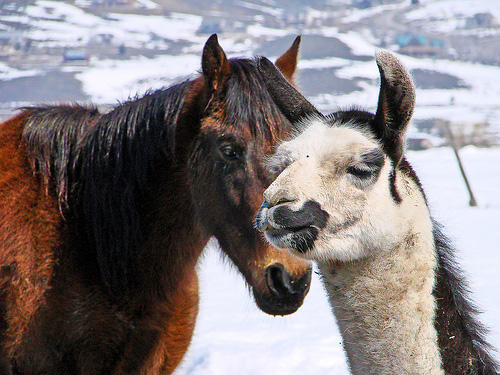Horses and Llamas

Horsemen and Llama Owners Work Together to Prevent Conflicts
by Nancy Russell
Reprinted from the November 1990 RMLA Newsletter and still relevant today.
In Salmon, Idaho this past summer an interesting and promising incident took place concerning llamas and horses/mules. There is a club by the name of "Back Country Horsemen here, and many of the members were interested in seeing how their animals would react to llamas. They were a little afraid of a "blow-up" on the trail someplace. So that club took it upon themselves to sponsor a "meet the llamas" evening at our fairgrounds.
They used the media of radio, newspaper, and telephone to attract as many people as possible that had horses and mules. They arranged this meeting with the few llama owners in the Salmon area and we all agreed to bring our animals at the appointed day. The Back Country Horsemen group provided ice water and cups to keep the thirsty animal owners happy.
The appointed evening came, and turnout was 6 llamas and around 20 horses and mules. We were instructed to first tie our llamas up along a hitching rack. The horse and mule owners then rode and led their animals near the llamas. It wasn't long before the horses and mules didn't pay much attention to the "funny looking fuzzy guys”. So then we took our llamas in to the rodeo grounds and walked around in among the horses and mules. Sometimes the llamas were a bit afraid of the large horses and mules and were not real excited about exchanging nose sniffs. It was a good time for llama folks to talk to horse and mule owners about the llama traits and how they worked on the trail. I had saddles and packs on our two. The rest of the llama owners did not.
This event probably lasted two hours and everyone seemed to go away feeling good about the whole thing. It was a great way to exchange llama and horse stories, and hopefully people found out that we weren't much different from them in taking pride in working with our llamas as they are working with their horses and mules. The ice water was gratefully appreciated after w0rking out in the hot sun all day. We llama owners really appreciated the horsemen club taking an interest in trying to share trail space peacefully.
Later this fall, Bob, a friend, myself and 5 llamas hiked up to some beautiful mountain lakes to fish a little and just enjoy t:he scenery. We happened to meet some of the Back Country Horsemen club members at another lake and later on the trail back to the trucks. We pulled the llamas back into the trees and let the horses go past us as usual. Their horses didn't pay us too much attention and the riders were glad to know that their horses had the opportunity to see and smell llamas before.
When we arrived back at our vehicles, the horsemen had parked their trailers next to our rigs and tied their mounts to the trailers, while they had a picnic supper. We had no choice but to walk through the horses to our rigs. Everyone was watching closely to see what might happen. Nothing did. The horses gave a nicker and paid us no mind.
The horse folks came over to pet the llamas and enjoyed watching us jump our llamas into the trucks. We were thankful that nothing happened, and l am sure it might have, if it were not for that horse/llama meeting earlier in the summer. It shows you what a little open-mindedness and cooperation can do.
Like this article? Become a RMLA Member today!

